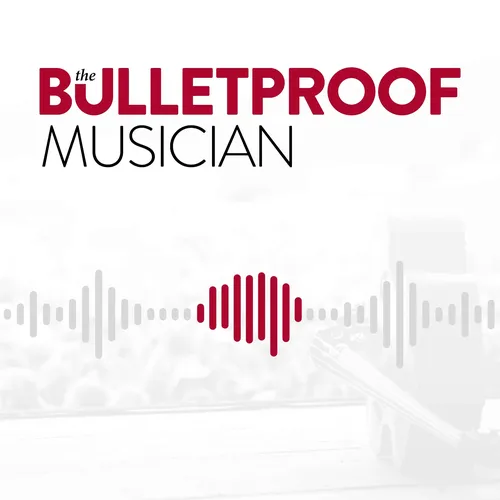
The Bulletproof Musician
Ever wonder why you can practice for hours, sound great in the practice room, and still be frustratingly hit or miss on stage? Join performance psychologist and Juilliard alumnus/faculty Noa Kageyama, and explore research-based “practice hacks” for beating anxiety, practicing more effectively, and playing up to your full abilities when it matters most.
- Update frequency
- every 7 days
- Average duration
- 17 minutes
- Episodes
- 394
- Years Active
- 2018 - 2025

Get Into "The Zone" More Frequently with This Subtle Mental Adjustment
Is getting into "the zone" something that just happens randomly? Or do we have more control over this than we realize? New research suggests that we actually do indeed.

A Comparison of Two Types of Anti-Choking Strategies
Pre-performance routines often consist of a number of different elements. But might simply squeezing a ball in your left hand a few times be just as effective?

Lori Schiff: On How Alexander Technique Can Enhance Learning and Performance Under Pressure
What is Alexander Technique, really? Will it help our playing? If so, in what way? How do we know if we need it? Learn more in this chat with Juilliard's Alexander Technique teacher Lori Schiff.

How Perfect Does Your Intonation Have to Be?
How much wiggle room do we have when it comes to intonation? Do pitch issues affect audience (and other musicians') opinions of the quality of a performance as much as we think they do?

Does Focusing on Musical Expressiveness in Performance Come at the Expense of Technical Precision?
It's often said that we should focus on "the music" when performing instead of the notes and technique per se. But does this come at a cost to technical accuracy?

A Mental Shift That Could Help You Produce a More Beautiful Sound on Stage
Ever have a teacher tell you to imagine performing to the very last row in a hall? Research suggests that this might be better advice than we realize.

Can’t Shut Off Your Brain and Get to Sleep? This 5-min Exercise Could Help.
Ever have difficulty shutting off your brain and getting to sleep? A recent study found that this 5-min writing exercise could help.
Can’t Shut Off Your Brain and Get to Sleep? This 5-min Exercise C…

Mark Kosower: On Learning Music, Slow Practice, and the Kind of Focus That's Associated With His Best Performances
Cleveland Orchestra principal cellist Mark Kosower talks about how he approaches learning music, and describes what exactly he is thinking about when he's having his best performances.
For additional…

A "Backwards" Strategy for Cultivating More Passion about Music You're Not in Love With
Sometimes we have to play music that we don't necessarily love. So is there anything we can do to cultivate some more enthusiasm about the piece anyway?

Should You Be Using a Metronome When You Do Mental Practice?
When you engage in mental practice, how aware are you of tempo? Might you be rushing or dragging? Here's some research on how that could have more of an effect on your performance than you might thin…

Why Worrying about Shaky Bow Just Makes Things Worse (and What You Could Focus on Instead)
Nothing strikes fear in the heart of a string player like a shaking bow arm. Of course, worrying about shaking is a surefire way to experience the shakes. So what can you do to keep your mind from go…

Jason Haaheim: On Practice, Talent, Motivation, and Playing the "Long Game"
Have you ever wondered (or worried) if you were talented enough? Met principal timpanist Jason Haaheim explains why this is the wrong question to be asking ourselves - and what we should be asking in…

How to Minimize Jet Lag and Perform Your Best When Crossing Multiple Time Zones
Ever wish there was a way to fight jet lag and not be such a zombie when you travel across multiple time zones? Here are 9 tips from two Stanford orthopedic surgeons' review of the literature.

Do Other People Really Learn As Quickly As It Seems Like They Do?
Have you ever practiced or studied in secret, afraid to let on how long it takes for you to learn something? Good news - other people are probably working harder than you think.

2 Ways to Shrink the “Intention-Behavior Gap,” Improve Your Follow-through, and Get Things Done
Ever get frustrated by how difficult it can be to follow through on big plans? Here are two strategies that research suggests can help you get over the hump.

Jay Larranaga: On Becoming the Best Version of Yourself That You Can Be
In this week's conversation, Boston Celtics assistant coach Jay Larranaga shares some of the key habits and characteristics that seem to be essential in becoming a top performer.

Why an “Improvisational Mindset” Could Be Vital to Reducing Performance Anxiety and Increasing Audience Engagement
It wouldn't seem that improvisation would have a place in classical music performance - but could this be one of the keys to a better performance experience - for both performer and audience?
Compari…

How a Post-Practice Workout Could Help Boost Learning and Retention
Research suggests that exercising after learning a new skill can help enhance the learning of that skill. So maybe the best time for musicians to work out is after a practice session?

Do Classical Musicians Get More Nervous Than Non-Classical Musicians? (And If so, Why?)
Is there something inherently different about classical music that makes classical musicians more anxious on stage? And if so, what could that possibly be?

8 Strategies Musicians Use to Create Their Own Unique Interpretation of a Piece
Ever wonder what exact strategies experienced musicians use to come up with their own unique interpretation of a piece? Research suggests that these 8 strategies might be a good place to start.
For l…